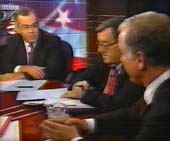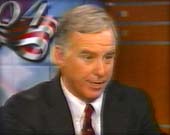|
 MARK
SHIELDS: Governor, Jim pointed out-- it is, it's Howard Dean's convention. It may be John Kerry's
nomination, but-- MARK
SHIELDS: Governor, Jim pointed out-- it is, it's Howard Dean's convention. It may be John Kerry's
nomination, but--
DEAN [disagrees]: -- Ehhh, I don't--
SHIELDS: There's a lot of antiwar feeling. There's a lot of people who were energized, galvanized by your candidacy.
You called Dick Gephardt, John Kerry, Joe Lieberman and John Edwards
"Bush Light" for their support of the war.
Now why should those people who supported you, who believed in-- as fervently
and passionately as so many did - some who didn't support you -- that
the war was wrong, that the Democrats had caved... why should they believe
John Kerry really means it, that he's just not gonna do this to win
the White House?
HOWARD DEAN: Well, I don't believe that about John Kerry. I think John
Kerry does mean it. I've gotten to know John Kerry since the primaries.
The reason I'm going out and working my you-know-what off for John
Kerry is 'cause I believe him. I believe he'll be a good president
and a much better president than George Bush.
Otherwise it would completely wreck my credibility with all the people
who supported me if I just became another politician and endorsed the
top of the ticket. That's not why I'm endorsing the top of the ticket.
 I
think the difference between John Kerry and George Bush is enormous.
And I think that a lot-- it is true that a lot of folks down here are sympathizers
with my point of view. Many of them are delegates. I
think the difference between John Kerry and George Bush is enormous.
And I think that a lot-- it is true that a lot of folks down here are sympathizers
with my point of view. Many of them are delegates.
We happen to have slated our delegates all the way through New York
and Pennsylvania and Illinois. Many of the Kerry and Edwards folks were
down to their last nickel and didn't do that.
So a lot of these folks are my delegates and they went as Kerry and
Edwards delegates; my point in this convention is we're all Kerry and
Edwards delegates.
I'm a Kerry and Edwards vote, and I want my people to be Kerry and
Edwards votes because it's the only chance America has to make progress.
JIM LEHRER: Well, have you had serious conversations with John Kerry
about what he believes about Iraq and what he will do, and other things
that really both bother you?
HOWARD DEAN: I have. I've had a lot of very serious conversations with
John Kerry. I don't make them public 'cause I've learned in politics
and as a rule I enforce myself that if somebody gives you advice publicly,
they're not gonna be doing it privately.
LEHRER?: Right.
I've become-- First of all, I like John Kerry. I think he's intellectually curious
and very thoughtful. I think he's deeply committed on issues like the
environment. I think he's an internationalist, which I am. We may have some--
JIM LEHRER: -- What's that mean? An internationalist is what?
HOWARD DEAN: That means we believe that nations are interdependent,
that the 'go it alone' philosophy of the Bush administration is a throwback
not only to the 20th century but the 19th century.
We have got to, in an extraordinary world that we're in, in order to
maintain the influence of the United States, we need to be interdependent.
We have lost influence. Kyoto (the greenhouse gases treaty), for example, is about to be agreed to
by the Russians.
No one when Kyoto was signed ever thought that Kyoto could go into
effect without the United States' signature. That's about to happen.
Why? Because George Bush has alienated so many people.
Among other things they've decided to go on about the world's business
without us. That is a very dangerous thing for the long-term power of
the United States.
|




